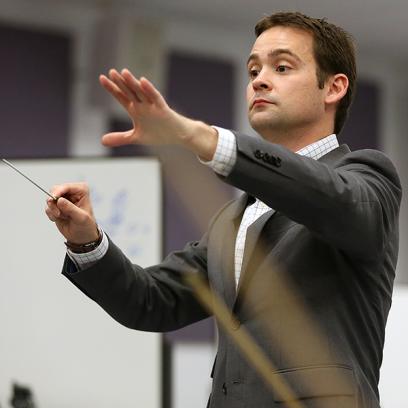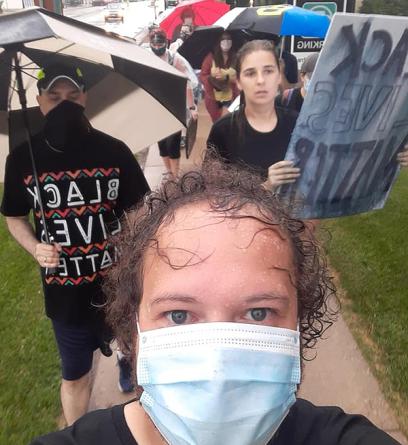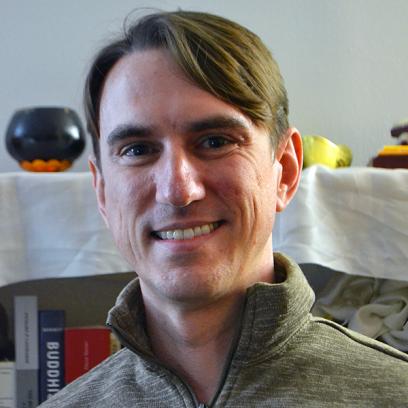A strategy-savvy, action-focused new AFT faculty local at the University of Wisconsin-Whitewater organizes during a pandemic, weathers a tough reopening fight and beats back 67 layoffs. And they’re just getting started.
In January 2021, University of Wisconsin-Whitewater Chancellor Dwight Watson (who had already imposed drastic faculty cuts throughout the UW system in February 2020) used the excuse of pandemic-created budget shortfalls to announce further planned layoffs of 72 staff at UW-Whitewater. Newly formed AFT local UWW United, which had begun organizing just a month before COVID-19 shut down the university, leapt into the fray.
Leading the charge were UWW United President Chris Ramaekers (director of orchestras and associate professor in the Music Department), Organizing Director Brandon Thomas (assistant professor in the Department of Psychology) and Recordkeeper and Treasurer Nathan McGovern (assistant professor in the Department of Philosophy and Religious Studies).
If you want to see the hopeful future of higher education organizing, you’ll find it right here. The Three Musketeers have nothing on these guys. Together with their colleagues, they’ve created a brand-new local during the first months of the COVID-19 lockdown. They bring a wisecracking but strategic sensibility to organizing and mobilizing, and a feisty yet thoughtful spirit to the fight against a university bureaucracy that thinks it can fire and cut its way to quality and sustainability. Not on their watch, UWW United decided.
Ramaekers remembers, “We decided, we can’t just sit by and let it happen. We knew layoffs were the wrong thing for the long-term health of the university. Cutting faculty and staff could not fix any challenge the university was facing. We knew this would be bad not only for whoever lost their jobs but for all of us.”
Says Thomas, “We couldn’t keep watching the students and staffing and funding all being hit.”
UWW United organized a campaign in which faculty and staff began lobbying the Faculty Senate to pursue a vote of no-confidence in Chancellor Watson. The Faculty Senate’s executive committee informed Watson that the no-confidence vote would be discussed at the Senate’s Feb. 3 meeting, where senators voted to hold a faculty-wide listening session about the no-confidence vote decision on Feb. 23. Before that session was even held, the administration announced at its “Chancellor’s Chat” that only five staff members’ contracts would not be renewed, and that there would be no more non-renewals for fiscal years 2021 or 2022. The new local had saved 67 jobs. (In the faculty-wide listening session on Feb. 23, a straw poll of faculty present led the group to decide that, given the administration’s backing down on the layoff issue, faculty would present a list of demands to the chancellor with deadlines, rather than pursuing a no-confidence vote—giving him one last chance, so to speak.)
“I’m elated by this victory, but sad that we had to have this fight to begin with,” says Ramaekers. “Still, we learned we could really make some noise. We learned we could move the needle.”
Thomas says, “Getting the victory, saving so many people’s jobs, was exciting, and an indication that we’d come very far. Some of our colleagues are still under the illusion that the chancellor will work with us, but most of us know now that we have to fight.”
McGovern says, “This was never really just a budget issue. One key reason we fought this fight is that we knew that UW-Whitewater would pay a high price in the future if we allowed this continuous cycle of cuts.”
He noted that enrollment has plummeted at UW-Stevens Point after a 2018 proposal to cut as many as 13 degree programs (a plan that ultimately failed).
‘It’s the corporatization of higher education, and we knew we had to organize against it’
Since taking office in August 2019, Watson has intensified the disinvestment-and-austerity approach that has plagued the UW system for years. In January 2020, even before COVID-19 hit, Watson announced significant budget cuts that would result in staff members losing their jobs—flouting the university’s tradition of shared governance, which entitles faculty to a say in how to address budget shortfalls. The Faculty Senate protested to no avail. In February 2020, UW-Whitewater deans were forced to terminate or reduce the full-time equivalents (FTEs) of dozens of instructional academic staff. Liberal arts programs were hit particularly hard.
In the spring of 2020, UW System President Ray Cross announced a “blueprint” to rapidly cut programs on campuses across the state. Luckily, the system quickly backtracked on the blueprint, due to an outcry from around the state, organized by AFT-Wisconsin.
But Watson continues to push “program optimization,” an approach in which academic programs are weighed against business-style metrics such as recent enrollment and the “bottom 20 percent” of programs are cut. Appalled at this agenda, a core group of faculty began meeting and organizing early in 2020, with help from AFT-Wisconsin Organizing Director Daniel Suarez and the wholehearted support of the state federation.
Ramaekers (who can’t really remember if he went to the first few organizing meetings but soon found himself president of the new local) says, “The chancellor made it clear that they want this program optimization to happen every year. It’s the budgetary opposite of the Lake Wobegon effect. There will always be a bottom 20 percent. It’s the corporatization of higher education, and we knew we had to organize against it.”
But the local’s first confrontation with Watson was even more life and death. The new officers found themselves fighting for their members’ health and safety during the university’s chaotic reopening process.
‘COVID was a wake-up call about the need to organize’
As the campus prepared to reopen, there were no COVID-19 testing facilities available at the university. In August 2020, UWW United wrote Watson demanding answers to questions about safety protocols for instruction. Watson refused to answer the union’s questions, claiming (wrongly) that state law prevented him from even speaking to a union.
“We had 34-year-olds making wills this summer,” Ramaekers remembers. “The lack of guidance or information from campus was sobering.”
Thomas, who remembers his shock when someone in his graduating class died of COVID-19, recalls, “We didn’t have the facilities to do teaching right—the reopening was so poorly planned. We wanted a voice in teaching modalities, whether we as individual faculty could teach remotely. Instead, people were assigned to teach in person who needed for health reasons to teach online. Some were doing both online and in-person teaching simultaneously.”
Things are better now, with the university operating at 60 percent hybrid status and testing facilities in place. But a lesson had been learned: “In a sense, COVID was a wake-up call about the need to organize. COVID set issues into stark relief. When your employer doesn’t seem to care about your physical safety, that makes boundaries much clearer,” Ramaekers says.
‘The culture of fear is starting to break’
The way forward won’t be easy for the new local. It is going up against a chancellor for whom intimidation is standard operating procedure. For example, when Watson announced the first round of budget cuts that would lead to the academic staff layoffs of January 2020, before the lockdowns began, he did so in an all-campus meeting at which, the union leaders observe, there was a very conspicuous campus police presence.
It helps that members of the new local know they’re not alone. Ramaekers says, “A fantastic AFT-Wisconsin resource has been being put in touch with other locals around the state. We have been in constant touch with the folks at UW-Stevens Point, and the solidarity with them has been invaluable.”
And these three leaders aren’t about to quit now. For them, trade unionism is personal.
Ramaekers says, “I’m originally from western New York. Unions are part of the culture of my family. But for me, it’s more related to my work in the Music Department. My approach to the union is that we can’t let the administration pit departments against each other.
Because what’s bad for the English Department can’t be good for the Music Department. As a university faculty, we have to function as a team. And if the administration won’t bring us together as a team, we will do it ourselves. It’s a common-good approach.”
For Thomas, the union is a natural part of his commitment to social justice. “I’ve been an activist my entire life. I was involved with Black Lives Matter over the summer, part of a group of people who started a daily march in Whitewater. We marched for 67 days straight. We wanted to start structural change, and we wound up partnering with the local government council to create an Equal Opportunity Task Force in Whitewater, which will start by tackling policing practices in the city. Because of the BLM work, I was nominated to be the organizing chair of the union.”
McGovern’s momentum lies in the progress he’s already witnessing: “I see a change. We just had a meeting yesterday, and there was a Q-and-A period with the chancellor. People really brought it. You wouldn’t have seen pointed questions like this before we had the union. I think the culture of fear is starting to break.”
The local has launched a new member recruitment and activism drive based on the layoff victory, and its goals are very focused. As Ramaekers puts it: “We have four main pillars: No jeopardizing our physical safety. Quality of programs. Model of self-governance. Make a strategic plan for the future.” He adds, “Amid all of the talk of budget cuts, and the slashing of the bottom 20 percent, the administration refuses to make a strategic plan for the university. They want to cut programs, but they have no targets or enrollment goals, and they refuse to make them.”
Thomas sums up the union’s vision: “UWW United was founded because we had so many threats but absolutely no power. It just looked like the university was being driven into the ground. Now we’re trying to regain some power for faculty, so we can stop this existential threat. And it’s starting to happen. We are changing the narrative.”
[Christina Bartolomeo]



